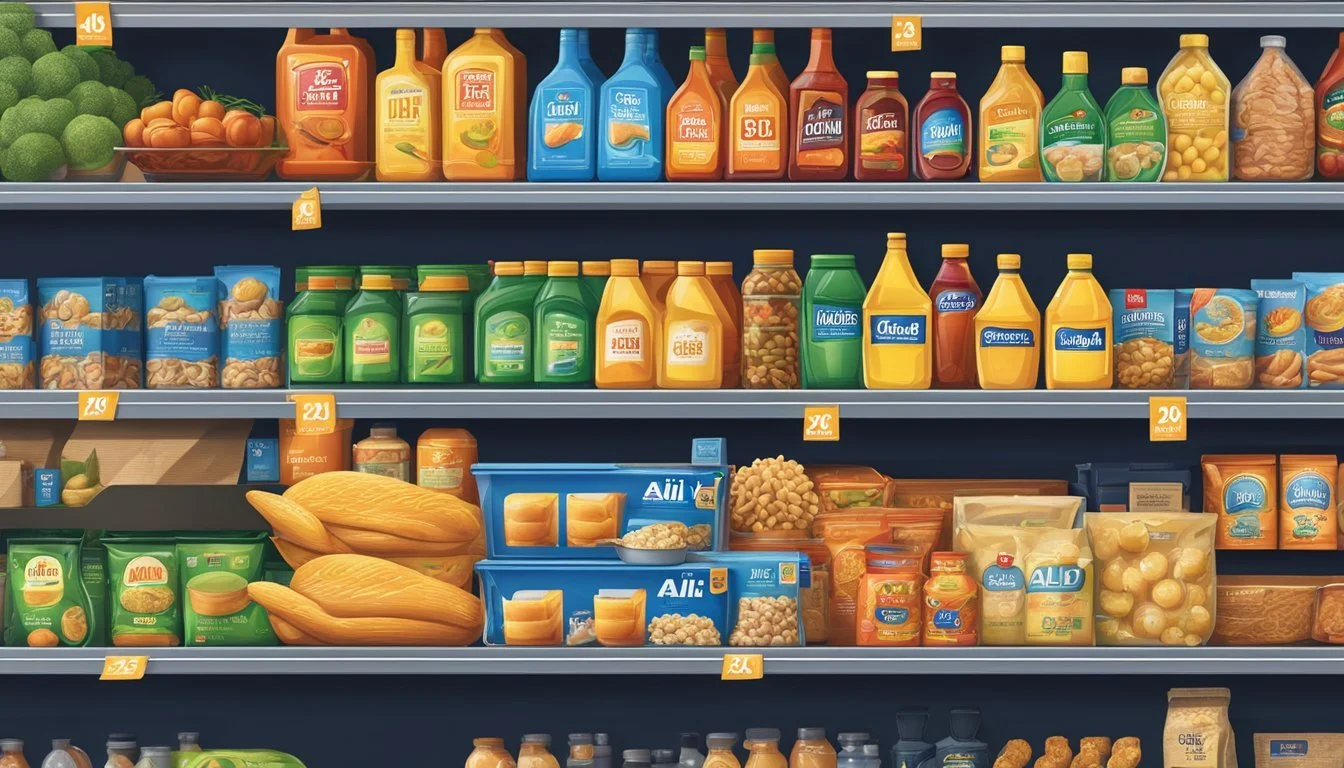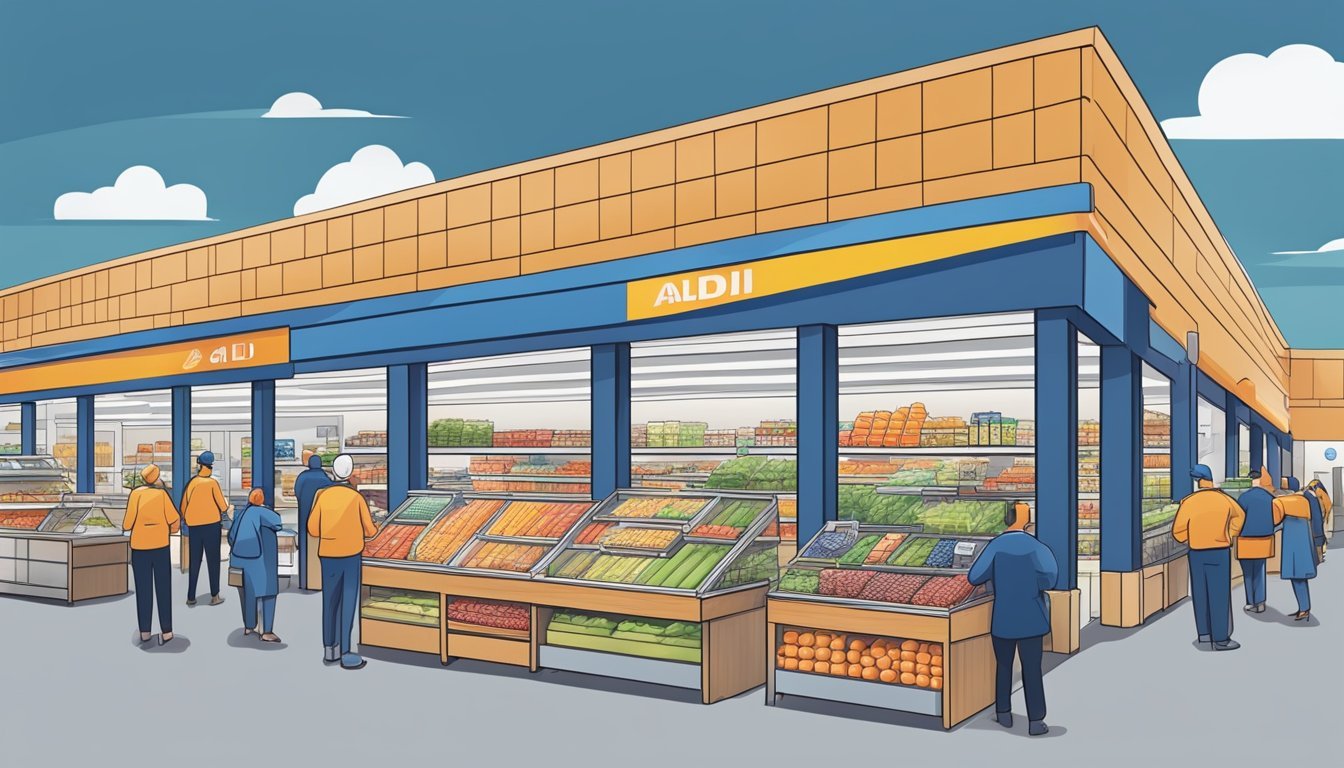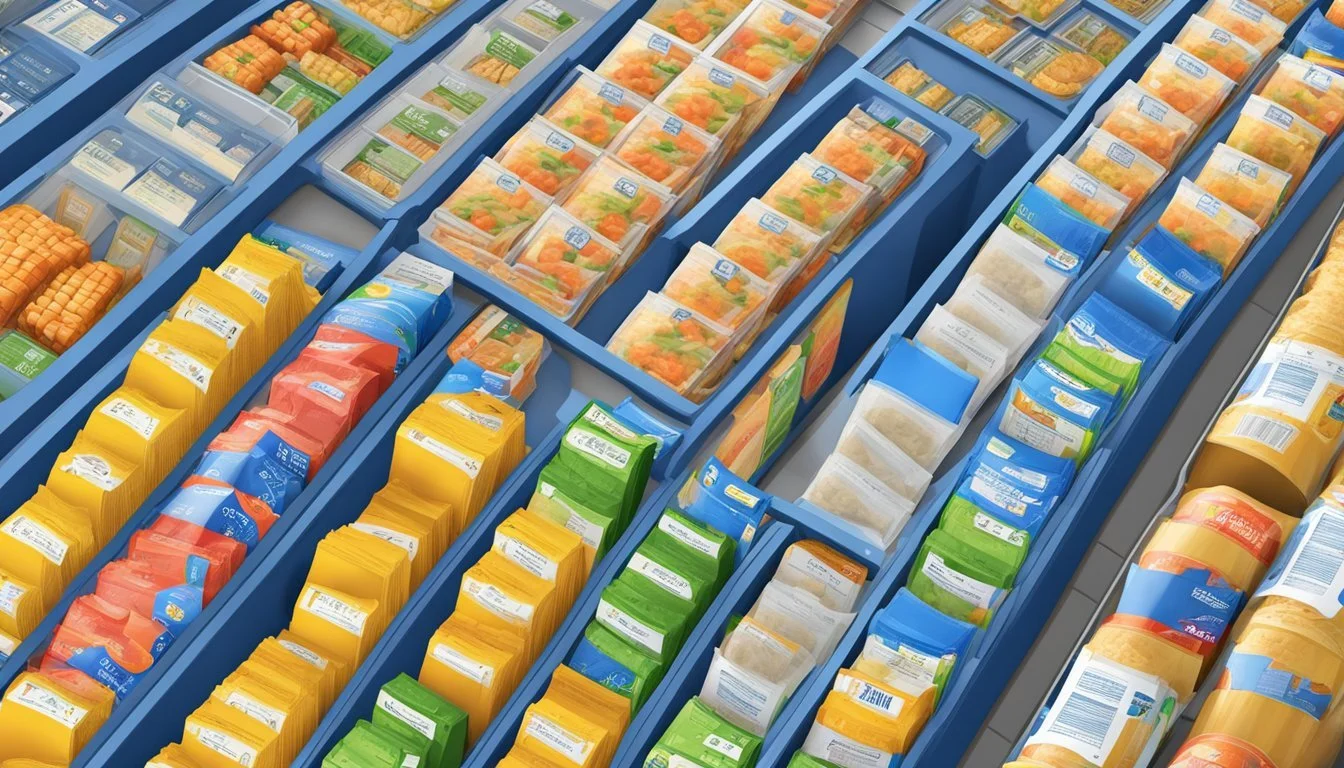Is Aldi Cheaper Than Lucky Supermarkets?
A Price Comparison Analysis
Grocery shoppers are always on the lookout for the best deals to stretch their budgets. Aldi and Lucky Supermarkets are two popular choices for affordable groceries, but many wonder which offers better savings.
Aldi tends to be cheaper than Lucky Supermarkets for most grocery items. The German-based discount chain is known for its no-frills approach and everyday low prices. Aldi keeps costs down through strategies like smaller store layouts, limited selection, and displaying products in shipping boxes to reduce restocking labor.
Lucky Supermarkets, while competitive, typically has higher prices than Aldi on average. However, Lucky may offer better deals on certain items or during sales. Savvy shoppers can find savings at both stores by comparing prices, taking advantage of promotions, and opting for store brands when available.
Company Overviews
Aldi and Lucky Supermarkets are two distinct grocery chains with different origins, operating models, and market positions. Both aim to provide value to customers but take different approaches.
Aldi at a Glance
Aldi is a German-founded discount supermarket chain that has expanded globally. It operates over 2,300 stores in the United States as of 2024.
Aldi's business model focuses on efficiency and cost-cutting. The company offers a limited selection of mostly private-label products. This approach allows Aldi to keep prices low.
Stores are typically smaller than traditional supermarkets and feature a no-frills layout. Aldi employs tactics like quarter-operated shopping carts and asking customers to bring their own bags to reduce costs.
The chain is known for its aggressive expansion strategy. Aldi added about 120 new U.S. stores in 2023 alone.
Lucky Supermarkets at a Glance
Lucky Supermarkets is a regional grocery chain primarily operating in Northern California. It's a subsidiary of The Save Mart Companies.
The chain offers a more traditional supermarket experience compared to Aldi. Lucky stores are generally larger and carry a wider variety of products, including national brands.
Lucky Supermarkets positions itself as a neighborhood grocery store. It aims to provide fresh, quality products at competitive prices.
The company operates fewer stores than Aldi but maintains a strong presence in its core market. Lucky focuses on customer service and community engagement as part of its business strategy.
Price Comparison Methodology
Comparing prices between Aldi and Lucky Supermarkets requires a systematic approach. This involves selecting representative products and accounting for various factors that influence pricing.
Factors Influencing Prices
Store location plays a significant role in pricing strategies. Urban stores often have higher operating costs, which can affect shelf prices. Seasonal fluctuations impact produce and certain staples. For example, berries are typically cheaper in summer.
Supply chain efficiency affects pricing. Aldi's limited SKU model and emphasis on private labels contribute to lower overhead costs. Lucky Supermarkets may offer a wider variety of national brands, potentially at higher price points.
Sales and promotions can skew comparisons. Aldi tends to maintain consistently low prices, while Lucky may rely more on weekly specials and loyalty programs.
Common Items Compared
A typical price comparison focuses on everyday staples. This includes dairy products like milk and eggs, bread, fresh produce, and pantry essentials such as pasta and canned goods.
Private label or store brand items are crucial for accurate comparisons. Both Aldi and Lucky offer their own lines, which are generally priced lower than national brands.
Comparison baskets often include:
Milk (1 gallon)
Large eggs (1 dozen)
Loaf of bread
Bananas (per pound)
Ground beef (per pound)
Pasta (16 oz)
Canned tomatoes
Cereal
Prices for these items are typically collected on the same day to ensure fairness. Multiple visits may be necessary to account for price fluctuations and special offers.
Cost Analysis by Product Type
Aldi and Lucky Supermarkets offer different pricing strategies across various product categories. A detailed comparison reveals notable differences in cost for key grocery items.
Dairy and Eggs
Aldi typically offers lower prices on dairy products and eggs compared to Lucky Supermarkets. A gallon of milk at Aldi often costs $0.50 to $1.00 less than at Lucky.
Eggs show a similar trend, with Aldi's prices frequently being 15-20% lower. Butter prices at Aldi are consistently competitive, often beating Lucky's prices by $0.75 to $1.00 per pound.
Aldi's store-brand dairy items contribute significantly to these savings, offering quality products at reduced costs.
Meat and Poultry
Meat and poultry prices can vary, but Aldi generally maintains an edge over Lucky Supermarkets. Chicken breasts at Aldi are often priced $0.50 to $1.00 per pound less than at Lucky.
Ground beef shows a similar pattern, with Aldi's prices typically 10-15% lower. However, Lucky occasionally offers competitive deals on certain cuts of meat through weekly specials.
Aldi's limited selection of meat products allows for better price control, while Lucky's wider variety may come at a higher cost.
Fresh Produce
Produce prices fluctuate based on seasonality and availability. Aldi often beats Lucky on staple items like bananas, apples, and potatoes by 10-20%.
However, Lucky Supermarkets may offer better deals on specialty or organic produce. Aldi's produce selection is more limited, focusing on popular items at lower prices.
Lucky's larger produce section provides more variety, but often at higher prices. Seasonal sales at both stores can significantly impact produce costs.
Bakery and Pantry
Aldi's bakery and pantry items are generally cheaper than Lucky's. Bread prices at Aldi are often $0.50 to $1.00 less per loaf compared to Lucky Supermarkets.
Flour and peanut butter show similar trends, with Aldi's prices typically 15-25% lower. Aldi's focus on private-label brands contributes to these lower costs.
Lucky Supermarkets offers a wider selection of brand-name products, which can be pricier. However, Lucky's store-brand alternatives and sales can sometimes match Aldi's prices on certain items.
Quality and Selection
Aldi and Lucky Supermarkets differ significantly in their product offerings and quality standards. Both stores aim to provide value, but take distinct approaches to selection and branding.
Store-Brand vs. Name-Brand
Aldi focuses heavily on private labels, with over 90% of products being store brands. These items often match or exceed the quality of national brands at lower prices. Aldi's exclusive brands like Simply Nature and liveGfree offer organic and gluten-free options.
Lucky Supermarkets carries a mix of store and name brands. Their private label, Simply Value, competes on price but may not match Aldi's quality consistency. Lucky offers more familiar national brands, which some shoppers prefer for perceived reliability.
Variety and Availability
Aldi's streamlined approach means a more limited selection, typically 1,400 items compared to 30,000+ at traditional supermarkets. This curated inventory focuses on essentials and popular products. Seasonal and rotating "Aldi Finds" add variety.
Lucky Supermarkets provides a broader range of choices. Shoppers find more options in each category, including specialty and international foods. Lucky's produce section is usually larger, with a wider selection of fruits and vegetables.
Aldi excels in organic offerings, often at lower prices than competitors. Lucky's organic selection varies by location but generally includes major organic brands.
Shopping Experience
Aldi and Lucky Supermarkets offer distinct shopping experiences that cater to different customer preferences. Their approaches to store layout, customer service, and promotional offerings shape how shoppers interact with each brand.
Store Layout and Design
Aldi stores are typically smaller than traditional supermarkets, with a streamlined layout designed for efficiency. Products are often displayed in their original shipping boxes, reducing restocking time and costs. This no-frills approach contributes to Aldi's ability to offer lower prices.
Lucky Supermarkets, in contrast, generally feature a more conventional grocery store layout. Aisles are wider, and products are arranged on shelves in a familiar format. This design allows for a broader product selection and a more traditional shopping experience.
Customer Service and Convenience
Aldi emphasizes a self-service model to keep costs down. Shoppers bag their own groceries and must bring or purchase reusable bags. Carts require a quarter deposit, encouraging customers to return them.
Lucky Supermarkets typically offer more personalized service, with staff available to assist customers and bag groceries. They often provide free bags and don't require deposits for carts. Lucky stores may also have additional departments like deli counters or bakeries.
Special Deals and Sales
Aldi is known for its "Aldi Finds" program, which introduces limited-time special buys on various products. These deals change weekly and can include anything from food items to household goods.
Lucky Supermarkets generally follow a more traditional sales model. They offer weekly specials, digital coupons, and loyalty programs. Lucky may have more frequent sales on name-brand items, while Aldi focuses on everyday low prices for their private label products.
Consumer Savings Strategies
Smart shoppers can significantly reduce their grocery bills by leveraging various cost-cutting tactics. These strategies allow consumers to maximize their savings while still obtaining quality products.
Loyalty Programs and Discounts
Many supermarkets offer loyalty programs that provide exclusive discounts and rewards to members. Aldi, while known for its low prices, does not have a traditional loyalty program. However, shoppers can sign up for Aldi's weekly newsletter to receive notifications about special buys and promotions.
Lucky Supermarkets, on the other hand, has a rewards program called "Lucky You Rewards." Members earn points on purchases, which can be redeemed for discounts on future shopping trips. They also gain access to digital coupons and personalized offers based on shopping habits.
To save money, consumers should compare the benefits of these programs and choose the one that aligns with their shopping patterns and preferences.
Bulk Buying and Seasonal Sales
Purchasing items in bulk can lead to substantial savings over time. Both Aldi and Lucky Supermarkets offer bulk-sized products at discounted rates. Shoppers should focus on non-perishable items or products they use frequently to avoid waste.
Seasonal sales present another opportunity for savings. Aldi is known for its rotating stock of seasonal items, often at competitive prices. Lucky Supermarkets typically runs promotions tied to holidays and seasons.
Consumers can save by:
Planning purchases around these sales
Stocking up on non-perishables during price drops
Freezing perishables bought in bulk for later use
By combining bulk buying with seasonal sales, shoppers can maximize their savings and reduce their overall grocery expenses.
Operational Efficiency and Store Policies
Aldi's success stems from its laser focus on efficiency and streamlined policies. These strategies allow the company to offer lower prices while maintaining profitability.
Labor Costs and Overhead
Aldi keeps labor costs down through several key practices. Stores are designed with efficiency in mind, featuring smaller layouts that require fewer staff to operate. Employees are cross-trained to handle multiple roles, reducing the need for specialized positions.
Product displays utilize "case-ready" packaging, eliminating the need for in-store butchers or bakers. This approach significantly cuts labor hours. Aldi also employs a "no-frills" shopping experience, with customers bagging their own groceries and returning carts to save on labor costs.
The company's lean operational model extends to its store hours. By operating during peak shopping times only, Aldi reduces overhead expenses related to utilities and staffing during slower periods.
Return Policies and Guarantees
Aldi offers a straightforward "Twice as Nice Guarantee" on its private-label products. This policy allows customers to receive a replacement product and a refund if they are unsatisfied with their purchase.
The guarantee builds customer trust and loyalty while showcasing Aldi's confidence in its house brands. It also reduces the need for extensive customer service infrastructure, as the policy is simple to execute in-store.
Aldi's return process is typically quick and hassle-free. Customers can return items without a receipt, as long as they have the original packaging. This policy minimizes administrative overhead and maintains efficiency at the checkout counter.
Consumer Sentiment and Brand Perception
Aldi has gained significant traction as an affordable grocery store option. Many customers view it as a budget-friendly alternative to traditional supermarkets.
A study by Retail Feedback Group revealed that Aldi received the highest score for value among surveyed retailers. This perception aligns with its reputation for cheap prices.
Customer satisfaction ratings for Aldi are competitive with larger supermarket chains. The same study found Aldi's overall satisfaction score (4.27 out of 5) was close to that of traditional supermarkets (4.31).
Aldi's private label brands have also contributed positively to its image. 84% of consumers rated Aldi's private label products as excellent or very good, compared to 78% for national brands.
The grocery chain's focus on energy efficiency in its stores has led to cost savings. These savings are often passed on to customers, reinforcing Aldi's image as a cost-effective option.
Aldi's rapid expansion in the U.S. market suggests growing consumer acceptance. The company added approximately 120 new stores in 2023, indicating strong demand for its offerings.
While Aldi excels in affordability, traditional supermarkets still maintain a slight edge in overall customer satisfaction. This suggests that factors beyond price continue to influence grocery shopping decisions.
Conclusion
Aldi emerges as the more budget-friendly option compared to Lucky Supermarkets. Its no-frills approach and focus on private-label products allow for significant savings.
Lucky Supermarkets offers a wider selection and more familiar brands. This can be appealing to shoppers seeking specific items or those who prefer name-brand products.
Price-conscious consumers will likely find better deals at Aldi. The German retailer's expansion across the U.S. demonstrates its growing popularity among budget-minded shoppers.
For a comprehensive grocery shopping experience, Lucky Supermarkets may have an edge. Their larger stores typically provide more services and a broader range of products.
Ultimately, the choice between Aldi and Lucky Supermarkets depends on individual preferences and priorities. Budget-focused shoppers will gravitate towards Aldi, while those valuing variety may prefer Lucky Supermarkets.









